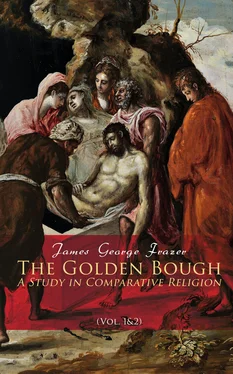Often the abduction of a man's soul is set down to demons. The Annamites believe that when a man meets a demon and speaks to him, the demon inhales the man's breath and soul.432 When a Dyak is about to leave a forest through which he has been walking alone, he never forgets to ask the demons to give him back his soul, for it may be that some forest-devil has carried it off. For the abduction of a soul may take place without its owner being aware of his loss, and it may happen either while he is awake or asleep.433 In the Moluccas when a man is unwell it is thought that some devil has carried away his soul to the tree, mountain, or hill where he (the devil) dwells. A sorcerer having pointed out the devil's abode, the friends of the patient carry thither cooked rice, fruit, fish, raw eggs, a hen, a chicken, a silken robe, gold, armlets, etc. Having set out the food in order they pray, saying: “We come to offer to you, O devil, this offering of food, clothes, gold, etc.; take it and release the soul of the patient for whom we pray. Let it return to his body and he who now is sick shall be made whole.” Then they eat a little and let the hen loose as a ransom for the soul of the patient; also they put down the raw eggs; but the silken robe, the gold, and the armlets they take home with them. As soon as they are come to the house they place a flat bowl containing the offerings which have been brought back at the sick man's head, and say to him: “Now is your soul released, and you shall fare well and live to gray hairs on the earth.”434 A more modern account from the same region describes how the friend of the patient, after depositing his offerings on the spot where the missing soul is supposed to be, calls out thrice the name of the sick person, adding, “Come with me, come with me.” Then he returns, making a motion with a cloth as if he had caught the soul in it. He must not look to right or left or speak a word to any one he meets, but must go straight to the patient's house. At the door he stands, and calling out the sick person's name, asks whether he is returned. Being answered from within that he is returned, he enters and lays the cloth in which he has caught the soul on the patient's throat, saying, “Now you are returned to the house.” Sometimes a substitute is provided; a doll, dressed up in gay clothing and tinsel, is offered to the demon in exchange for the patient's soul with these words, “Give us back the ugly one which you have taken away and receive this pretty one instead.”435 Similarly the Mongols make up a horse of birch-bark and a doll, and invite the demon to take the doll instead of the patient and to ride away on the horse.436
Demons are especially feared by persons who have just entered on a new house. Hence at a house-warming among the Alfoers of Celebes the priest performs a ceremony for the purpose of restoring their souls to the inmates. He hangs up a bag at the place of sacrifice and then goes through a list of the gods. There are so many of them that this takes him the whole night through without stopping. In the morning he offers the gods an egg and some rice. By this time the souls of the household are supposed to be gathered in the bag. So the priest takes the bag, and holding it on the head of the master of the house says, “Here you have your soul—go (soul) to-morrow away again.” He then does the same, saying the same words, to the housewife and all the other members of the family.437 Amongst the same Alfoers one way of recovering a sick man's soul is to let down a bowl by a belt out of a window and fish for the soul till it is caught in the bowl and hauled up.438 Among the same people, when a priest is bringing back a sick man's soul which he has caught in a cloth, he is preceded by a girl holding the large leaf of a certain palm over his head as an umbrella to keep him and the soul from getting wet, in case it should rain; and he is followed by a man brandishing a sword to deter other souls from any attempt at rescuing the captured soul.439
The Samoans tell how two young wizards, passing a house where a chief lay very sick, saw a company of gods from the mountain sitting in the doorway. They were handing from one to another the soul of the dying chief. It was wrapped in a leaf, and had been passed from the gods inside the house to those sitting in the doorway. One of the gods handed the soul to one of the wizards, taking him for a god in the dark, for it was night. Then all the gods rose up and went away; but the wizard kept the chief's soul. In the morning some women went with a present of fine mats to fetch a famous physician. The wizards were sitting on the shore as the women passed, and they said to the women, “Give us the mats and we will heal him.” So they went to the chief's house. He was very ill, his jaw hung down, and his end seemed near. But the wizards undid the leaf and let the soul into him again, and forthwith he brightened up and lived.440
The Battas of Sumatra believe that the soul of a living man may transmigrate into the body of an animal. Hence, for example, the doctor is sometimes desired to extract the patient's soul from the body of a fowl, in which it has been hidden away by an evil spirit.441
Sometimes the lost soul is brought back in a visible shape. In Melanesia a woman knowing that a neighbour was at the point of death heard a rustling in her house, as of a moth fluttering, just at the moment when a noise of weeping and lamentation told her that the soul was flown. She caught the fluttering thing between her hands and ran with it, crying out that she had caught the soul. But though she opened her hands above the mouth of the corpse, it did not revive.442 The Salish or Flathead Indians of Oregon believe that a man's soul may be separated for a time from his body without causing death and without the man being aware of his loss. It is necessary, however, that the lost soul should be soon found and restored to the man or he will die. The name of the man who has lost his soul is revealed in a dream to the medicine-man, who hastens to inform the sufferer of his loss. Generally a number of men have sustained a like loss at the same time; all their names are revealed to the medicine-man, and all employ him to recover their souls. The whole night long these soulless men go about the village from lodge to lodge, dancing and singing. Towards daybreak they go into a separate lodge, which is closed up so as to be totally dark. A small hole is then made in the roof, through which the medicine-man, with a bunch of feathers, brushes in the souls, in the shape of bits of bone and the like, which he receives on a piece of matting. A fire is next kindled, by the light of which the medicine-man sorts out the souls. First he puts aside the souls of dead people, of which there are usually several; for if he were to give the soul of a dead person to a living man, the man would die instantly. Next he picks out the souls of all the persons present, and making them all to sit down before him, he takes the soul of each, in the shape of a splinter of bone, wood, or shell, and placing it on the owner's head, pats it with many prayers and contortions till it descends into the heart and so resumes its proper place.443 In Amboina the sorcerer, to recover a soul detained by demons, plucks a branch from a tree, and waving it to and fro as if to catch something, calls out the sick man's name. Returning he strikes the patient over the head and body with the branch, into which the lost soul is supposed to have passed, and from which it returns to the patient.444 In the Babar Islands offerings for evil spirits are laid at the root of a great tree (wokiorai), from which a leaf is plucked and pressed on the patient's forehead and breast; the lost soul, which is in the leaf, is thus restored to its owner.445 In some other islands of the same seas, when a man returns ill and speechless from the forest, it is inferred that the evil spirits which dwell in the great trees have caught and kept his soul. Offerings of food are therefore left under a tree and the soul is brought home in a piece of wax.446 Amongst the Dyaks of Sarawak the priest conjures the lost soul into a cup, where it is seen by the uninitiated as a lock of hair, but by the initiated as a miniature human being. This is supposed to be thrust by the priest into a hole in the top of the patient's head.447 In Nias the sick man's soul is restored to him in the shape of a firefly, visible only to the sorcerer, who catches it in a cloth and places it on the forehead of the patient.448
Читать дальше












